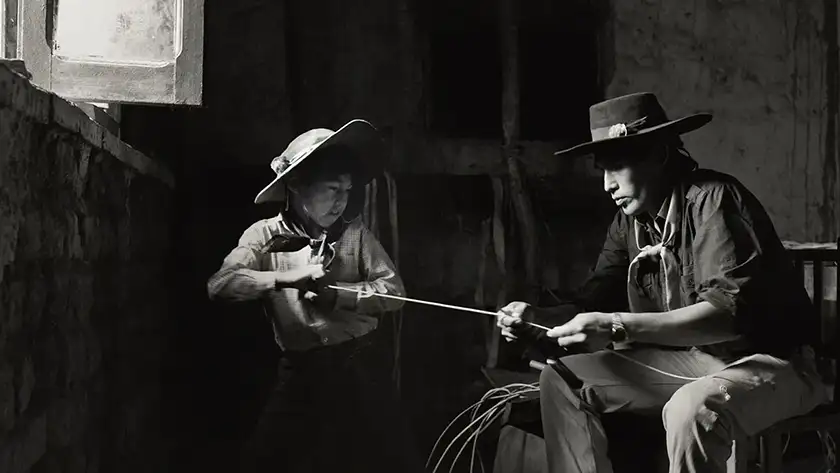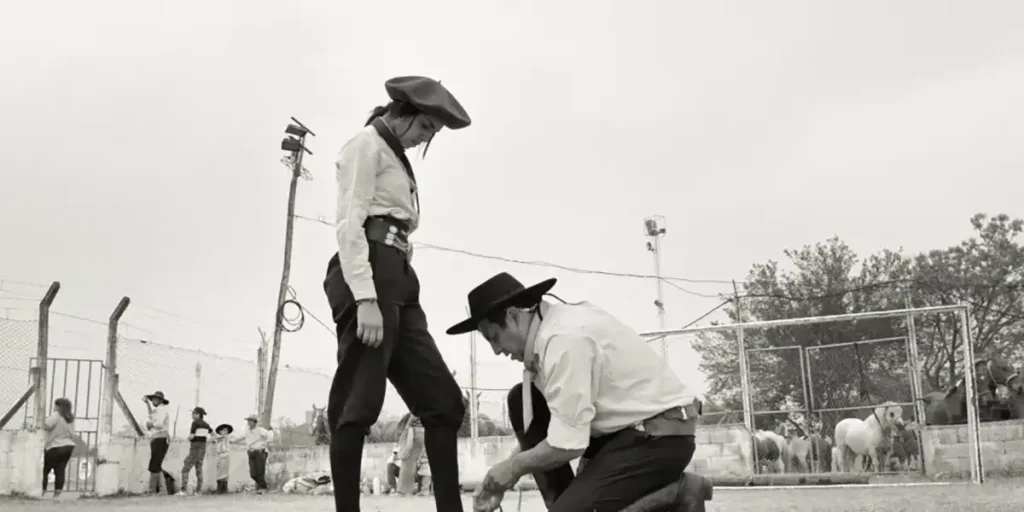Michael Dweck and Gregory Kershaw return with Gaucho Gaucho, a visually stunning portrait of a subculture that feels more like a Western than a documentary.
Directors: Michael Dweck & Gregory Kershaw
Genre: Documentary
Run Time: 85′
DOC NYC Screenings: November 16 (Angelika) and November 18, 2024 (IFC Center)
U.S. Release: December 1, 2024
U.K. Release: TBA
Where to Watch: Stream it on Jolt (US)
Gaucho Gaucho opens with two contrasting shots either side of its title card. The first sees one of the eponymous Argentine cowboys emerge from his slumber, the horse he had been resting with rising reluctantly after him. The stillness and close proximity of the camera, nestled with its subjects in the pasture, is almost immediately juxtaposed with the thrilling subsequent tracking shot of the gaucho and his peers riding like the wind to the sound of the opera duet ‘Au fond du temple saint’. This melange of contradictions, marrying stillness with motion, romance with reality, human with beast, sets the tone aptly for a remarkable documentary.
The gaucho is a dying breed of horseman once popular in the literature and cinema of the 19th and 20th centuries. Living off the land in humble rural communities, like the Hollywood cowboys of North America they have become icons in the south. This is especially true in Argentina, where the figure of the gaucho represents a premodernism for which those disillusioned with contemporary life yearn. Directors Michael Drweck and Gregory Kershaw (The Truffle Hunters) attempt to reconcile this folkloric image with the reality of today, but seem as vulnerable to the mythmaking of the gauchos as anyone. In an inspired move, they choose to exploit this potential flaw, eschewing mere factual reportage in favour of something more spiritually ambitious. Gaucho Gaucho is a film for the soul, not the mind.
The structure is very loose, following the daily lives of a few standout figures, among them a local priest, a radio host and the charming father-son duo of Solano and Jony. It’s all anchored by the story of Guada, a schoolgirl determined to force her way into the boys’ club and become a bona fide gaucha. We see her training her horse, competing in rodeo events and discussing the future consequences of her lifestyle with family. Her presence is one of several elements that bring into question the significance of the gaucho in the contemporary world. In the scene that gives the film its name, young Jony expresses his desire not just to playact as a gaucho, but to be authentic, the real deal, ‘a gaucho gaucho’. What exactly that means in the 21st century, if it ever meant anything specific at all, is a problem that courses subtly through the film’s veins.

This question hovers over scenes of cinematic reverie as the fantasy image of the gaucho clashes with a more complicated reality. But those looking for a probing investigation will be disappointed; a film depicting such a conservative rural community is ripe for exploring contemporary concerns like gender inequality, climate change or animal cruelty, to name a few, yet Dweck and Kershaw are more interested in the legend of the gaucho tradition. If that weren’t the case, they wouldn’t have adorned their film with such breathtaking imagery. We find ourselves immersed in this anachronistic world through black-and-white photography and traditional low-angle and cowboy shots à la John Wayne, accompanied by a rousing soundtrack from music supervisor Jonathan Finegold. At times it’s hard to believe that what we are watching isn’t entirely staged, such is the sublime magnificence of the cinematography.
With its credits rolling before the 80 minute mark, Gaucho Gaucho is an all-too-brief foray into a life that exists only in the imaginations of most. As this magic world makes way for dull reality, the imprint it leaves is like that of a dream, and what we are left feeling is more important than anything we might have learned. Perhaps that’s also true for the waning gaucho tradition itself.
Gaucho Gaucho will be screened at DOC NYC on November 16, 2024 at the Angelika Film Center (with a filmmaker Q&A) and on November 18 at the IFC Center. The film will be available to stream on Jolt from December 1, 2024. Read our review of the DOC NYC-premiering There Was, There Was Not.

